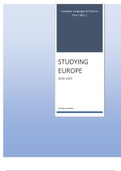STUDYING EUROPE | Course overview
European Languages & Cultures
Year 1 Bloc 1
STUDYING
EUROPE
2018-2019
Course overview
, Studying Europe | R. Dekker
TABLE OF CONTENTS
1. Introduction to Studying Europe
a. The Economist – Between the borders
b. Sachsenmaier – Chinese definitions of the European
c. Rietbergen – Europe: a cultural history
2. Identity and alterity, Europe and its others
a. Patrick – Language analysis for determination of origin: objective evidence for refugee
status determination
b. Garton Ash – Is Britain European?
c. Mierau – Exploring new worlds
3. Diversity and cohesion
a. Leggewie – Seven circles of European memory
b. De Swaan – Endangered languages, sociolinguistics, and linguistic sentimentalism
c. Middelaar – Seven Brexit propositions: towards a union that protects
4. Progressive and conservative thought
a. Kant – Enlightenment
b. Ossewaarde – The national identities of the ‘death of multiculturalism’ discourse in
western Europe
5. Power and authority
a. Jensen – Defining the nation
b. Nortier & Dorelijn – A Moroccan accent in Dutch: a sociocultural style restricted to the
Moroccan community?
c. Gilleir – Feeling
d. Karamzin – Poor Liza
6. Revolution, modernization and urbanization
a. Newman – The Medieval and early modern city in literature
b. More – Utopia
7. Final session, the challenges ahead
a. Jones & Subotic – Fantasies of power: performing Europeanization on the European
periphery
, Studying Europe | R. Dekker
WEEK 1
INTRODUCTION TO STUDYING EUROPE
The Economist – Between the borders.
Sachsenmaier – Chinese definitions of the European.
Rietbergen – Europe: a cultural history.
, Studying Europe | R. Dekker
Lecture notes
• EU identity as a social construct.
• Dimension: cultural, political, linguistic.
• Key concept: identity
o “Je suis mon passé” → Sartre, “I am my past”
o “Not what happened, but what is remembered is significant” → Pound
o Quoted in Rietbergen
o A countries history is written in the standardized language → regional history automatically falls
outside of that.
• Key concept: collective memory
o Objectification of memory in ‘sites of memory’ (Pierre Nora). E.g. l’Arc d’Triomphe was copied
everywere. We objectify our history/memory in a pretty banal way. These objects bind us together.
Another example is famous Europeans on coins.
o Ritual enactment of memory (Victor Turner) → Remembering (how?) the oppression of the
East-Indies. Should we talk about it?
o Language as prerequisite for memory (Bertrand Russell) → language is our medium for what we know
about history, all our knowledge is written down, but by whom? And how? → This influences the
written history.
• Key concept: constructivism
o Identity, lanbuage, scientific knowledge, institutions and histography are social and cultural constructs
which have both historically developed structures and, at the same time, determine the course of
history.
o Who or what creates this institutions? What dynamics cause them to change? Who has the power? →
there are constant negotiations going on.
o What are the key actors to the processes that brought us where we stand now in Europe? → Key
question for the upcoming weeks.
• Constructions of Europe
o Geographical dimension → Shifting boundaries and political identities. Who decides about where
Europe ends? According to French Enlightment thinkers, Europe ended at the Pyrenees, not at
Gibraltar. Geographical borders are (in this way) cultural boundaries. Doesn’t mean that there are
no political (real, physic) borders.
o Linguistic dimension → A family of languages? E.g. Indo-Germanic. However, there are
exceptions: language in the Basque Country, in Hungary. Dialects? ‘Foreign’ languages? → A lot of
Urdu (Pakistan) speakers in the UK: is Urdu now a European language? In a lot of political
institutions, your identity will be determined by your language.
o Political dimension → Shared institutions: Europol, Frontex. Do not have the same public visibility
as your own notional PM or parliament. We are constantly negotiating the value of these
institutions: populist parties are sceptic. All the institutions are recent, not very stable and widely
discussed.
o Cultural dimension → A shared cultural past? A shared library? → Dante, Goethe, Multatuli,
Bronte: accepted figures within the shared culture. However, in the 1950’s only 2% of the
national library was written by women: cultural history adapted to the male perspective of that
history. Bridget Jones Diary (Pride & Prejudice): reproduces ‘medieval’ stereotypes about men
and women: cultural representation. Thus, looking at this cultural representation, gay
relationships are still odd. Even though Europe looks progressive, its still strict, e.g. the boundary
of monogamy.
o All these constructs are changing and we try to understand them.





